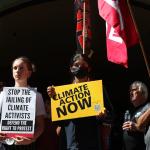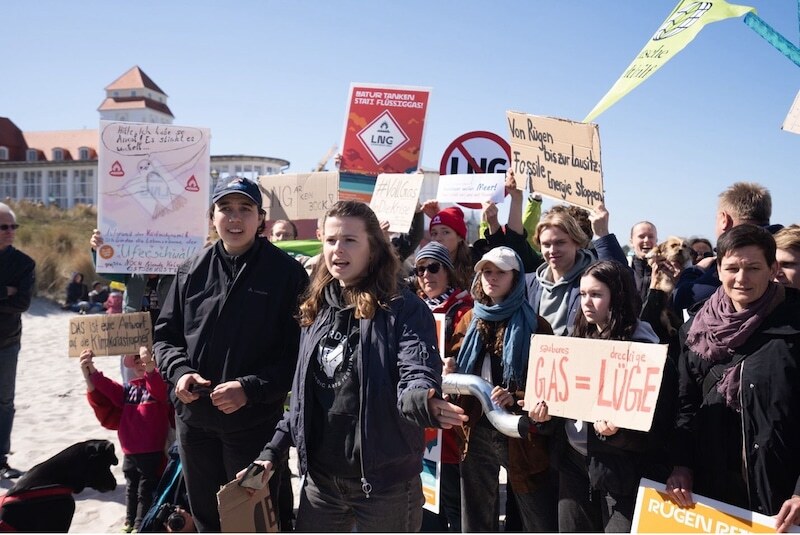World Governments Are Using ‘Increasingly Harsh’ Laws Against Climate Protesters

Democratic governments have been using “increasingly harsh, overly broad, and vague” laws against climate activists and protesters, according to a new report and video by nonprofit human rights group Climate Rights International (CRI).
Countries are imposing long prison sentences, bringing criminal charges against climate activists for trivial offenses and engaging in preventative detention, a press release from CRI said.
“You don’t have to agree with the tactics of climate activists to understand the importance of defending their rights to protest and to free speech,” said Brad Adams, CRI’s executive director, in the press release. “Instead of jailing climate protesters and undermining civil liberties, governments should heed their call to take urgent action to address the climate crisis.”
The report, On Thin Ice: Disproportionate Responses to Climate Change Protesters in Democratic Countries, documents the increasingly authoritarian treatment of climate protesters in Germany, France, the Netherlands, Sweden, Australia, the United States and the United Kingdom.
By bearing down on climate activists, countries are violating their duties to protect the basic rights of freedom of assembly, expression and association, the report said.
The report pointed out that the protests are fueled by frustration with the inaction of governments in the face of increasing climate crisis impacts. Concerned citizens are exercising their basic rights to peaceful protest and civil disobedience, just as they did in the civil rights, anti-apartheid, anti-colonial and centerpiece of the suffragette movements.
“The fact is that climate activism is not something you’re born into, but it’s something you stand up to do no matter where you are in your life. And I would say from all the years of activism and for all the thousands of people I’ve spoken with, the one really most powerful answer to desperation is action,” Luisa Neubauer, a climate activist, told CRI.

Climate activist Luisa Neubauer speaks to activists protesting against an LNG terminal being built in Germany, on April 30, 2023. Fridays4Future.
Governments are required by international law to protect and respect the basic rights of freedom of expression, assembly and association, but, rather than safeguarding them, many countries are looking to outdated legislation or enacting new laws restricting peaceful protest and imposing disproportionate punishments.
A recent example is the unprecedented prison sentences given to five protesters in the United Kingdom for “conspiring to cause a public nuisance” on a major roadway in London.
“We’ve been protesting in the streets for 50 years now. We’ve been signing petitions for 50 years now. And our emissions are still rising. So, the time of nicely asking is just over,” Sieger Sloot, a Dutch climate protester, said in the report.
Another case in Australia involved charges being brought against Deanna “Violet” Coco under a law in New South Wales that permitted a prison sentence of as much as two years for anyone entering or remaining on a tunnel or bridge if it causes any portion of the structure to be closed or pedestrians or vehicles to be redirected.
In the U.S., felony charges carrying a sentence of as long as five years in prison with a fine of up to $250,000 were brought against Joanna Smith and Timothy Martin for smearing a protective case housing a statue in Washington, DC’s National Gallery with water-soluble paint.

Timothy Martin and Joanna Smith at the National Gallery in Washington, DC on April 27, 2023. Cece Russell-Jayne
“I interrupted what I love, which is art and culture and all the things we go to museums to celebrate, I interrupted that ever so briefly and delicately to try to help protect it. And to try to help save what we are all about to lose, which is everything that we love if we don’t address the climate crisis,” Smith told CRI about the motivation behind her National Gallery action.
CRI called on countries’ governments to adopt protective measures in support of safe and responsible demonstrations, to protect the fundamental right to peaceful protest, to repeal or amend laws targeting peaceful protesters, to allow evidence in court of climate change motivations behind actions and to adopt legislation that creates a public interest defense in legal proceedings that involve climate protesters.
“July 2024 was the 14th month in a row to become the hottest month on record. Governments should reflect on the absurdity that each new month also seems to include record breaking sentences for climate protesters,” Adams said in the press release. “Governments should see climate protesters and activists as allies in the fight against climate change, not criminals. The crackdown on peaceful protests is not only a violation of their basic rights, it can also be used by repressive governments as a green light to go after climate, environmental, and human rights defenders in their countries.”
Cristen Hemingway Jaynes is a writer of fiction and nonfiction. She holds a JD and an Ocean & Coastal Law Certificate from University of Oregon School of Law and an MA in Creative Writing from Birkbeck, University of London. She is the author of the short story collection The Smallest of Entryways, as well as the travel biography, Ernest’s Way: An International Journey Through Hemingway’s Life.
EcoWatch is a long-time leader in environmental news. Founded in 2005 as an Ohio-based environmental newspaper, today we are a digital platform still dedicated to publishing quality, science-based content on environmental issues, causes, and solutions. While we’ve grown from a grassroots newspaper of 80,000 print copies to a site with a digital audience of more than two million monthly readers, we are still committed to our founding principle: creating a sustainable future.
